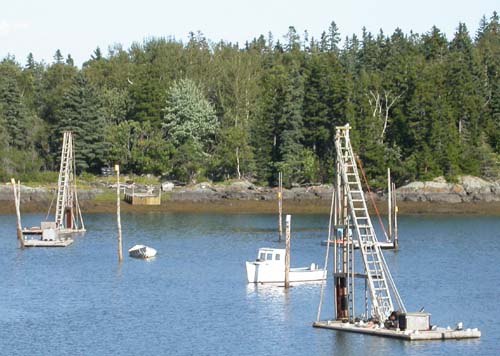A couple of weeks ago, Barry and I were sorting our socks in the “Soap Bubble,” Lunenburg’s only laundromat. On the folding counter, we’d set aside the notebook where we were compiling a grocery list.
Mundane stuff, not usually of interest to travelogue readers like yourself.
A tall, lanky guy with a neatly trimmed beard came into the laundry. He was stuffing his clean clothes into a compact orange duffel bag when he glanced our way. “Cruising Notes,” he read out loud from the cover of the notebook. “Are you cruisers?”
I looked down at the medium-sized notebook, one of a half-dozen I’d accidentally-on-purpose removed from the supply room at Microsoft. At the time, Barry had complained, “I can’t tell them apart!” so I decorated each one differently with markers, stickers, and ribbons. This one, as you know, said “Cruising Notes” in inch-high letters, with pictures of waves and junk-rigged sailboats and globes. We were currently using it for lists, notes, limericks, doodles — everything but the cruising notes for which it was originally intended.
Now folks who cruise on sailboats usually have no trouble recognizing each other. They end up in the same anchorages, marinas, or waterfront pubs, and they know each other as much by the names of their boats as by their given names. So those of us who are boatless or away from our boats have a harder time finding someone who “speaks boat,” so to speak.
In a very short time, we discovered that Kris is a world cruiser, working on a circumnavigation of North and South America. He carries a South African passport, but his accent is that wonderful mix of sounds that indicates he’s lived in many, many places. He calls himself a “professional foreigner.” He’s currently doing some work on a tall ship named Larinda. “Come on down and see her,” he said. “Most people call her a junk rig, but you’ll recognize it as a fully-battened lug rig.”
That evening, Barry and I wandered down to the boatyard for a look. The Larinda was a project boat more daunting than any we’ve ever seen, and that includes Jim Fine’s Gulfstar in New Orleans. The engine removed, furnishings ripped out, and bare sections of hull recently patched and slowly being cured. Kris is justifiably proud of his ingenious washing machine sprinkler system and timer setup to keep the ferrocement damp.
I was confused by what I saw. The boat looked ancient, like an old hulk that had been abandoned for years. But her tale is more tragic than most: She was only launched six years ago, after someone lovingly spent 28 years building her.
The impact of 2003’s Hurricane Isabel on the U.S. was so devastating that most Americans were unaware of Hurricane Juan, which made unprecedented landfall at Halifax, Nova Scotia. Larinda was one of the victims. Holed by another boat in 100-mph winds, she sank in the harbor there. Like many Canadian cities (Victoria, B.C. is one), Halifax doesn’t treat their sewage, and Larinda sank right in a sewer outfall. She sat there for three weeks before being salvaged. Pee-yoo!
Fortunately, her new owner knows a thing or two about sewage, being in the business of treating cruise ship waste. That boat has been scrubbed with every cleaner known — she may look a mess, but she’s not even stinky now.
Our tour ended, appropriately, in the forward head, where you could see signs of the boat’s former grandeur. Over the bathtub, with its whimsical frog fixtures, the walls are covered with full-color hand-painted tile showing Larinda sailing in her former glory, all her butterfly-like sails set. She was a beauty, and one day she will be again.
Back in the galley, or what remains of it, Kris broke out a bottle of Cuban rum he’s been saving since his trip to Cuba last year. We pulled up a folding chair and launched into an evening of what Brian always called, “Sea Stories and Fairy Tales.” If you don’t know the difference, show up with a bottle of rum sometime and we’ll tell you. But don’t be surprised if it takes until 2 o’clock in the morning, as it did on the Larinda, with our new friend Kris.

